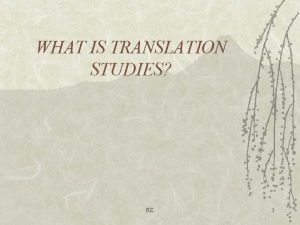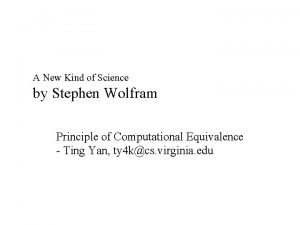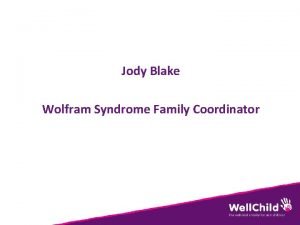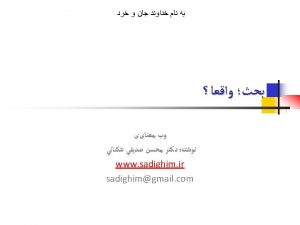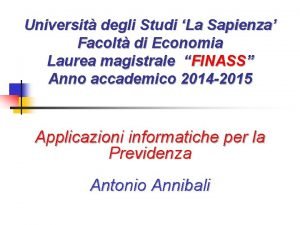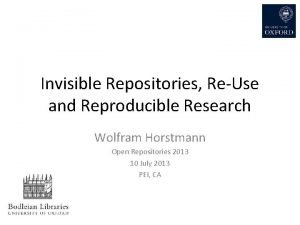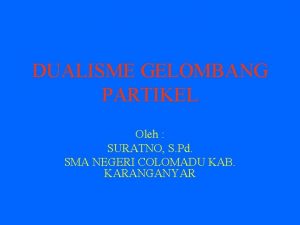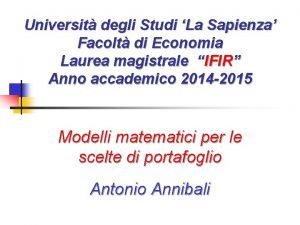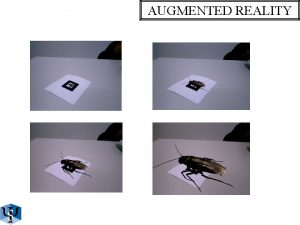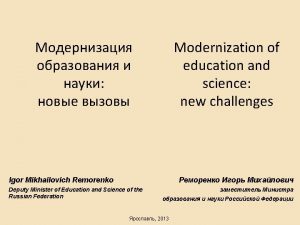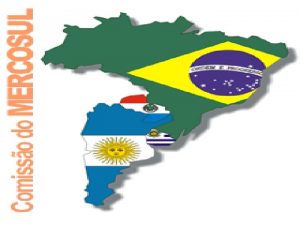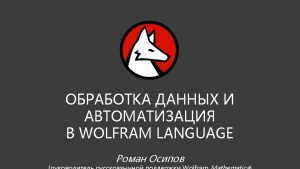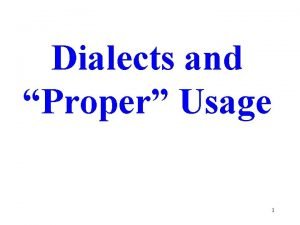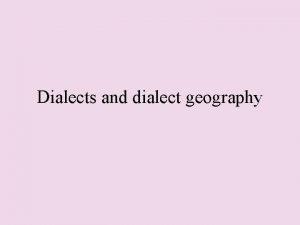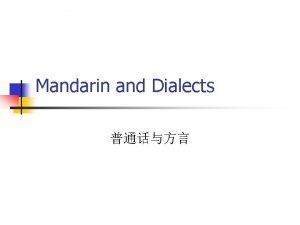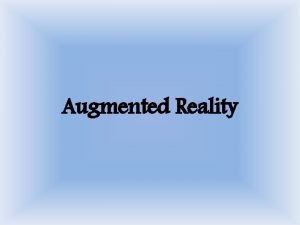The Reality of Dialects Wolfram W 1991 Dialects














- Slides: 14

The Reality of Dialects Wolfram, W. (1991) Dialects and American English. Englewood Cliffs, N. J. : Prentice Hall. Chapter one. The reality of dialects (pp. 1 -20)

• People are more interested on HOW other people talk rather than WHAT they talk. • It is very common to make judgments about social class, ethnicity, regional background, social characteristics, based on just the kind of language people use.

DIALECT • It is a neutral label to refer to any variety of a language which is shared by a group of speakers. • There are particular social factors which correlate with this diversity. They may range from geography to social class or age.

DIALECT: THE POPULAR VIEW PONT Linguists have their own definition for this term; however, nonspecialists tend to use dialect in a somewhat different sense.

Commonly-held beliefs about dialects “We went to the coast of Carolina for a vacation and the people there sure do speak a dialect” In this case, dialect refers to the way in which some people simply speak differently from the local, native community of speakers.

“I know we speak a dialect in the mountains, but it’s a very colorful way of speaking” Another common use of this term refers to those varieties of English whose features have, for one reason or another, become recognized through our society.

“The kids in that neighborhood don’t really speak English; they speak a dialect”. Dialect is also used to refer to a kind of deficient or “broken” English. It is perceived as an imperfect attempt to speak “correct” or “proper” English.

“The kids in this school all seem to speak the dialect”. Dialect often serves as an indirect label for a particular socially disfavored variety of English.

Standars and vernaculars • Formal Standard: Applied primarily to written language and the most formal spoken language situations; objective standards prescribed by language “authorities”; standards codified in usage books, dictionaries, and other written texts; a single norm for acceptable usage.

• Informal Standard: Applied in spoken language, determined by actual usage patterns of speakers; listener juddment essential in determing socially acceptable norms; multiple norms of acceptability, incorporating regional and social considerations.

• Vernacular: Applied to spoken language; determined by actual usage patterns of speakers; listener judgment essential in determing social unacceptability; stereotyping of speakers based upon linguistic forms; defined by the presence of socially stigmatized linguistic structures.

Why Languages Have Dialects? Wolfram, W. (1991) Dialects and American English. Englewood Cliffs, N. J. : Prentice Hall. Chapter two. Why languages have dialects (pp. 21 -41)

One side of the explanation for dialects is found in the social and historical conditions that sorround language change. As language operates as a highly structured communicative code, it also functions as a kind of cultural behavior. That is the reason why that social differentiation of various types should go hand in hand with language differences. In the ideal situation for dialect development, both physical and social separation take place between groups of speakers.

Some of the factors that set the stage for dialect differentiation are: • • • • Settlement Migration routes. Language contact. Economic ecology. Social stratification. Communication networks. Group reference. Character attributes. Linguistic explanation Generalization Analogy Redundancy reduction. Naturalness. Innovation.
 Holmes translation studies
Holmes translation studies Wolfram fourier series
Wolfram fourier series Stephen wolfram a new kind of science
Stephen wolfram a new kind of science Sophie wolfram
Sophie wolfram Wolfram
Wolfram Wolfram proksch
Wolfram proksch Https://www.wolframalpha.com
Https://www.wolframalpha.com Isaac newton życiorys
Isaac newton życiorys Pierwiastek wolfram
Pierwiastek wolfram Finass sapienza
Finass sapienza Sindrome mauriac
Sindrome mauriac Wolfram
Wolfram Sebuah filamen wolfram memiliki panjang 20 cm
Sebuah filamen wolfram memiliki panjang 20 cm Ifir sapienza
Ifir sapienza Wolfram nyquist
Wolfram nyquist
